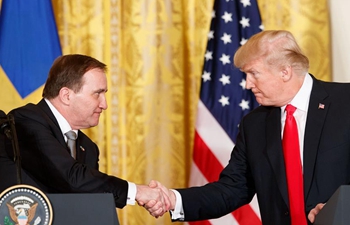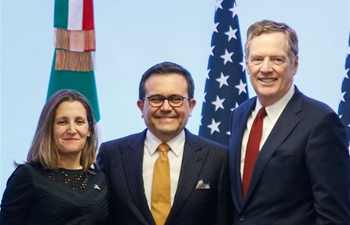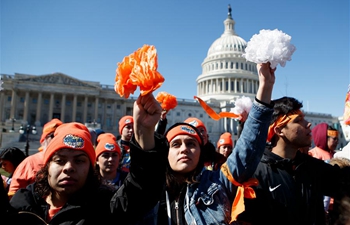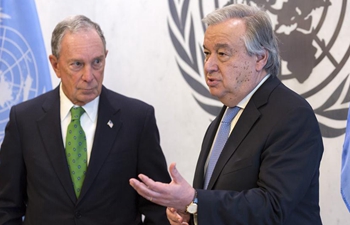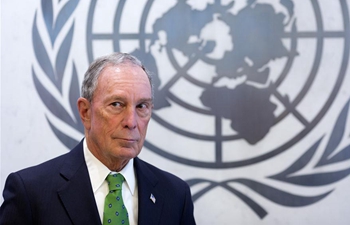DENVER, the United States, March 6 (Xinhua) -- A leading U.S. military academic Tuesday called on the Trump Administration to step up to the plate and "keep the momentum going" with talks that could pull nuclear weapons out of the Korean Peninsula.
"This is a major breakthrough," Lyle Goldstein of the U.S. Naval War College told Xinhua about top leader of the Democratic People's Republic of Korea (DPRK) Kim Jong Un's pledge to immediately freeze missile and nuclear weapons testing during proposed talks with the United States and South Korea.
South Korean national security adviser Chung Eui-yong hammered out the talks and a summit next month between the two Koreas during a four-hour dinner with Kim, his wife and other senior DPRK officials.
The top national security adviser for South Korean President Moon Jae-in led a 10-member special delegation to visit Pyongyang for two days from Monday.
The two sides agreed to hold the third inter-Korean summit talks in late April. The first and second inter-Korean summit meetings were held in Pyongyang in 2000 and 2007 respectively.
Goldstein, 46, urged U.S. officials to address the DPRK's "security needs," not to exclude a "symbolic withdrawal of some U.S. troops," as a move that might bring both sides closer to detente.
"You must give, in order to receive," Goldstein said, citing the recent Iran talks failing because Tehran perceived it was getting nothing in return.
The Princeton Ph.D. commended U.S. President Donald Trump's cautious tweet on Monday as being appropriate, saying that "possible progress" is occurring between the United States and the DPRK.
"It is time for Donald Trump to speak more than 'nice' words," Goldstein said. "I would hope his reaction will have more substance to it, such as some economic incentives."
He called the nuclear situation between the United States and the DPRK a doomsday scenario on every level, and equated its urgency with the tension-filled Cuban Missile Crisis of 1962.
Goldstein emphasized that the United States should "exercise diplomacy first" and be "slow to anger," as the DPRK has successfully tested an underground nuclear weapon and could easily strike Seoul or Tokyo within minutes.
"Imagine if a nuclear warhead hit Tokyo ... that would be unthinkable," he said.
Goldstein heaped praise on South Korean negotiators who offered the DPRK a number of incentives, which might coax Pyongyang away from its nuclear threats.
In his 2015 book Meeting China Halfway: How to Defuse the Emerging US-China Rivalry, Goldstein not only addressed ways to improve U.S.-China relations, but also spent considerable length detailing how to deal with Korean Peninsula issue.
He listed a few suggestions in the book which might provide confidence and hope to the DPRK, including easing up on trade restrictions, encouraging investment and trade, and normalizing relations.
"We've seen what angry words and a military build-up have produced," Goldstein said.
Goldstein, a professor and strategic researcher at the Naval College's China Maritime Studies Institute, is an expert on Chinese and Russian security strategies.
He said the involvement of China and Russia might help the challenging negotiations that lie ahead, criticizing
"If I was in their shoes I'd be doing a lot more to stop the escalation," he said. Recently, South Korea and the DPRK also agreed to set up a hotline between the leaders to ease military tensions and closely coordinate. The first talks through the hotline will be held before the summit.







